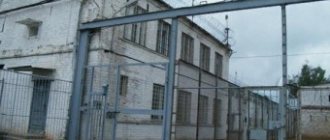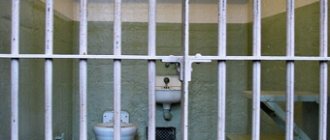What it is?
A general regime colony is a closed type penal colony . It provides detention for adult citizens after the entry into force of a court sentence for men for serious crimes (who have not previously served a sentence), for women sentenced to imprisonment for committing serious and especially serious crimes, including any type of recidivism.
In addition to general regime colonies, there are other types of closed institutions. Let's figure out what the difference is between them.
How is it different from other correctional institutions?
This institution has quite a lot of differences. The following are the most important differences from other colonies.
Main differences:
- The conditions of detention for citizens serving sentences are more lenient than in strict and special regime colonies: they are allowed to spend more money on food, and are entitled to more visits and transfers from relatives.
You can learn more about the conditions of detention of prisoners in a maximum security prison in a separate article, but in this material we talked about what the main differences are between staying there and in other correctional institutions.
- The contingent of criminals is also different - not to say that everything is absolutely good there as in colony settlements, but everything is not as cruel as with repeat offenders in strict regimes.
How are correctional institutions different?
Today in the Russian Federation there are many types of correctional institutions, each of which has its own characteristics.
The colony
According to the Criminal Executive Code, adult prisoners serve their sentences in colonies. Moreover, such institutions are divided into several categories. The type of colony in which a person will serve his sentence is determined in court.
Correctional
There are several types of serving conditions in correctional colonies - light, ordinary, strict. In the first two cases, convicts live in dormitories; in strict cases, they are kept in locked rooms.
Expert opinion
Karnaukh Ekaterina Vladimirovna
Graduated from the National University of Shipbuilding, majoring in Enterprise Economics
Prisoners serving life sentences are held exclusively in cells, with a maximum of 2 people. Depending on the type of colony and the conditions of detention, the number of visits, calls, and parcels varies.
Settlement
Such institutions house prisoners who have committed offenses due to negligence. They also place people there for intentional crimes of minor and medium gravity. Prisoners from general or strict regime colonies are also transferred there for exemplary behavior.
In colony settlements, convicts are often kept without guards, but under the control of the administration. They can move freely around the territory. With the permission of the administration, convicts are even allowed to travel outside the institution.
In addition, prisoners can wear civilian clothes and use money. They live in special dormitories. Families are often allowed.
Jail
This term is used to refer to secure institutions in which prisoners are kept in cell-type premises. They practically never leave them.
Pre-trial detention center
Pre-trial detention centers are used to hold suspects and accused persons, for whom detention is considered a preventive measure. This means that people who are under investigation and awaiting trial are placed in pre-trial detention centers. Also there are persons who are on trial.
In some situations, pre-trial detention centers perform the functions of correctional institutions. Convicts are kept there and must perform housekeeping work or be sent to correctional facilities after the court verdict comes into force. Also, convicts are admitted to pre-trial detention centers during their transfer from one place of punishment to another.
Correctional centers
These institutions are created on the basis of colonies. They can also be organized on the site of former special commandant's offices. Such institutions are intended for serving sentences in the form of forced labor.
comparison table
The main differences between correctional institutions are recorded in the table:
| Criterion | Jail | The colony |
| Movements within the territory | Excluded. | Acceptable. |
| Job | Hardly ever. | Plays a major role. |
| Correction | Unlikely. | Leaves an imprint and eliminates the possibility of subsequent offenses. |
| Kinds | None. | It can be strict, correctional, educational, therapeutic. |
Photos of general regime colonies
Photos were kindly borrowed from the official pages of these institutions: PKU IK-1 OF THE FSIN OF RUSSIA FOR THE TVER REGION, Federal State Institution “Correctional Colony No. 1 of the Federal Penitentiary Service of Russia in the KBR” (FKU IK-1).
Other modes
In addition to strict, general and prison regimes, the Criminal Code provides for at least three more, each with its own characteristics:
- special in a correctional colony - clause 6 of Article 74 of the Penal Code of the Russian Federation, Article 124 of the Penal Code of the Russian Federation;
- regimes of the educational colony - clause 3 of Art. 74 Penal Code of the Russian Federation, Art. 132 Penal Code of the Russian Federation;
- colony-settlement regime - clause 9 of Art. 74 of the Penal Code of the Russian Federation, Article 128 of the Penal Code of the Russian Federation.
Only citizens who have reached the age of criminal responsibility for a crime, but have not reached the age of majority, are sent to educational colonies. Conditions of detention are divided into preferential, light, strict and ordinary. Only persons sentenced to life imprisonment, as well as those who have committed a particularly dangerous recidivism, qualified in accordance with Article 18 of the Criminal Code of the Russian Federation, are placed in a special regime penal colony.
As in all correctional colonies, the conditions of detention include a light, strict and normal regime. They are sent to colony settlements for unintentional crimes or crimes of moderate severity , as well as by transfer from third-party correctional institutions on the basis of Article 78 of the Penal Code of the Russian Federation.
What offenses can you get there for?
Convicted men end up in this correctional institution if they have committed a serious crime for the first time (that is, they have not previously served imprisonment). Also included here are malicious violators of the established order from settlement colonies and convicts from colonies for juvenile offenders when they reach adulthood.
Women end up in a place of serving a general regime sentence for serious and especially serious crimes committed for the first time, as well as any repeat offenders.
Jail
Criminals sentenced to a term of more than 5 years for committing a particularly serious crime, as well as after being recognized as a persistent offender while serving a sentence in a correctional colony by a court decision for a term of up to 3 years, end up in prison cells. They are also sent to prison if there is evidence of a particularly dangerous recidivism, where the person commits a serious or especially serious crime, where he was previously convicted of 2 serious or 1 especially serious crime (Article 18 of the Criminal Code of the Russian Federation). In prisons, only males serve their sentences (we talked about where and how women serve their sentences in Russia here).
How is the life of prisoners organized in prisons?
The conditions for keeping criminals in prison are regulated by Articles 130 and 131 of the Penal Code of the Russian Federation . Based on the principle of disciplinary and material restrictions provided for by the Executive Code of the Russian Federation, the detention regime is divided into two types: general and strict.
The law does not provide for easier conditions for serving a sentence in prison. All newly arrived convicts, as well as those to whom disciplinary sanctions and penalties were applied while serving general terms, are subject to strict conditions. If good behavior occurs after 1 year, the convicted person can be transferred to general conditions.
According to clause 4 of Art. 131 of the Penal Code of the Russian Federation, general conditions for serving:
- monthly cash expenses: no more than 7200 rubles;
- long/short dates: no more than 2 per year;
- transfers of 20 kg and 5 kg: 2 per year;
- daily walks from 2 to 2.5 hours.
According to clause 5 of Art. 131 of the Penal Code of the Russian Federation, strict conditions for serving:
- monthly cash expenses: no more than 6 thousand rubles;
- long visits: one per year;
- short visits: two per year;
- large and small parcels: one per year;
- daily walks from 1.5 to 2 hours.
Convicts who are disabled people of groups I-III cannot be kept in strict conditions. Convicts are housed exclusively in closed cell-type premises in accordance with the provisions of Article 80 of the Penal Code of the Russian Federation. The maintenance regime is changed no earlier than 1 year after the last installation.
Difference between IR and prison
Main differences in table form:
| Strict IR | Jail | |
| Number of short/long dates per year | At least 2, but not more than 4 | At least 1, but not more than 2 |
| Number of large/small parcels per year | At least 2, but not more than 6 | At least 1, but not more than 2 |
| Limit on monthly expenses | from 7800 rub. up to 9000 rub. | From 6000 rub. up to 7200 rub. |
| Freedom of movement, living conditions | Dormitories, closed premises | Enclosed spaces |
| Content Modes | Easy, ordinary, strict | General, strict |
Conditions of serving the sentence
In accordance with Article 121 of the Penal Code of the Russian Federation, prisoners are subject to various conditions of detention: ordinary, light and strict. Initially, all convicts are placed in normal conditions .
Subsequently, they can be transferred to light or strict conditions of detention for convicted prisoners by decision of the commission.
Comparison of living conditions in a general regime colony:
| Conditions | Accommodation | Amount of funds allowed for spending, rubles | Permitted number of visits, short-term and long-term, per year | Permitted number of parcels or transfers per year | Permitted number of parcels, per year | Daily walks, h |
| Regular | Dormitory | 9000 | 6+4 | 6 | 6 | — |
| Lightweight | Dormitory | No limits | 6+6 | 12 | 12 | — |
| Strict | Lockable room | 7800 | 3+3 | 3 | 3 | 1,5 |
Convicts can get into lighter conditions for a conscientious attitude to work and exemplary behavior during six months of their sentence under normal conditions.
But if criminals staying in light conditions violate the established order, they will be transferred to ordinary or strict conditions. Those convicted for malicious violation of the order of serving a sentence may go from ordinary to strict conditions . Convicts are transferred from strict conditions to ordinary conditions only after six months in the absence of penalties.
Daily walks in the regular and lightweight ones are thinning out, since the peredvizhniki there are more free than in the strict ones. In a strict condition, the prisoner sees nothing at all except his cell and work (well, the walk is 1.5 hours).
Conditions of detention
The general regime colony is divided into several zones:
- living room - it contains cells, a toilet, a shower or bathhouse, and a dining room;
- production - here convicts work;
- for relaxation and walks - libraries, theater, etc.;
- administrative;
- punishment cell.
The cells can be of different sizes, but usually they can accommodate 40 people. Existing space standards for prisoners are different: for men the minimum size is two square meters, for women - three and a half. Bunk beds are installed in two rows.
The bathroom and kitchen are located separately from the main chamber. In women's colonies, duty is mandatory. Cleaning is carried out daily morning and evening . Prisoners are provided with clothing: underwear, shirts, outerwear, shoes. On average, the wear life of clothes and shoes is three years, and that of underwear is one year. In winter, they are provided with warm clothes and shoes designed to last for three years.
Schedule
The management of each correctional institution independently establishes the daily routine of prisoners in accordance with the Internal Rules, but it should not go beyond the law. The working conditions of the correctional institution, geographical location, time of year and other conditions are taken into account.
The approved daily routine is signed by the head of the colony and brought to the attention of staff and prisoners. Prisoners must be provided with eight hours of uninterrupted sleep. The daily routine includes time for: getting up and going out, exercising, going to the toilet and making beds, eating, working with a lunch break, morning and evening checks, as well as personal time, all this is reflected in Order of the Ministry of Justice of Russia dated March 27, 2019 N 51. Here approximate daily routine :
- rise no later than 5:00 - 6:00;
- exercises, hygiene procedures, filling beds - up to 45 minutes;
- 30 minutes are allotted for breakfast;
- morning check, inspection of appearance - up to 30 minutes;
- the first part of the work shift;
- lunch, which should take 40 minutes;
- second part of the work shift;
- dinner takes place within 30 minutes;
- personal time is 1 hour 30 minutes;
- evening check, getting supplies for sleeping, toilet - everything should take up to 30 minutes;
- lights out.
Separate schedules are also provided for educational activities and receptions on personal matters. On weekends, the daily routine changes - cultural and sports events, school and college education are added to it.
Nutrition
In general regime correctional institutions, prisoners are provided with three hot meals a day - breakfast, lunch and dinner. The menu is monotonous and meager .
- For breakfast, usually porridge (barley or oatmeal, once a week - millet), cooked in water, often undercooked.
- For lunch - first thing: cabbage soup made from combined fat (it is difficult for the body to digest); second: porridge with something resembling pieces of meat; drink: weak tea solution.
- For dinner - wormy fish with the same poorly cooked porridge. The bread is also of rather low quality, made from very poor flour.
The main food for prisoners is pasta and cereals. They diversify with vegetables such as cabbage, onions, potatoes and beets. Meat is included in the diet. It is of very low quality. Sometimes meat is replaced with low-grade sausages and canned food. Fresh fruit is rare in the colony. Sometimes they bring apples, but more often dried fruits.
Meager food standards in the zone are not observed. But prisoners can choose better food by buying food in a store if they have enough money in their personal account.
More information about the nutrition of prisoners in Russian prisons can be found here.
Job
According to Article 103 of the Penal Code of the Russian Federation, every prisoner is obliged to carry out labor duties . The administration of the correctional institution selects a feasible job for the person serving his sentence, taking into account the gender, age, physical condition of the prisoner, and his specialty. If a prisoner refuses to work, then the administration of the colony records a malicious violation of order, and the violator is sent to a punishment cell (we talked about the peculiarities of the stay of prisoners in a punishment cell and other places for punishment in the MLS in a separate article). As a result, the prisoner loses the right to parole.
In some colonies, work is a privilege due to the lack of vacancies. In this case, the management of the correctional institution selects the most qualified convicts for work, but tries to attract as many prisoners as possible to work - they bring profit to the colony, and it is easier to monitor busy prisoners.
Convicts interested in work receive work experience, which increases their chances of early release. For conscientious work, working prisoners have the opportunity to receive incentives and concessions in the regime .
In some cases, for work, convicts can receive monetary remuneration into their personal account, send it to relatives if necessary, compensate for material damage caused to them, and pay alimony. But more often than not, this income is barely enough to buy food.
Often, prisoners are employed under Article 106 of the Penal Code of the Russian Federation for a full work shift, and according to the law, only two hours a week are allowed to work for free, for certain citizens and in their free time. But there is a reservation that, at the written request of the convicted person, he can work more than the allotted time. Unscrupulous colonial leaders take advantage of this clause and recruit unsuspecting people into free labor.
Prisoners work in a variety of fields - they sew clothes and shoes for themselves, the Federal Penitentiary Service, the Ministry of Internal Affairs and the Ministry of Defense, they pack food, and make furniture.
Studies
Often, educated people end up in colonies, some with one or two higher educations. But if the convicted person does not have any education and he wants to get a certificate, a working profession or graduate from a university, then he can receive basic (complete), primary vocational or higher education within the walls of a correctional institution. This right is enshrined in Articles 108 and 112 of the Penal Code of the Russian Federation.
Prisoners who have completed their education have the opportunity to find a job after returning from prison, but not every employer will agree to hire a former prisoner.
Entertainment and relaxation
In their free time from work, as well as on weekends, convicts can walk in a specially designated area , communicate, watch TV, and visit the library. They organize theatrical performances for themselves, FSIN employees and invited guests, go in for sports, play chess, backgammon, and cards.
Or they write letters to relatives, friends, or get to know each other by correspondence. An increasing number of convicts visit churches located on the territory of correctional institutions.
Citizens who have broken the law acutely feel the need for repentance and spiritual rebirth . While behind bars, they analyze their actions, they have a need to share their thoughts with the priest, repent and free themselves from guilt. At such moments, clergy come to their aid, providing moral support to the condemned, helping them to comprehend their sin and take the path of correction.
Often, spiritual and moral correction helps a believing criminal, after release, not to take the slippery slope again.
Dates and visits
The number of meetings with relatives depends on the conditions in which the convicted person is kept.
According to Article 121 of the Penal Code of the Russian Federation, convicts in general regime colonies under normal conditions have the right to six short-term and four long-term visits per year . Also, according to Article 89, Part 2.1, those serving a sentence in a general regime have the opportunity to have up to two long monthly visits with a minor child under 14 years of age on weekends and holidays with accommodation outside the correctional institution, but in the locality in which the place of serving the sentence is located.
Those serving a sentence in a general regime colony under light conditions are entitled to six short-term and six long-term visits per year. They also have the right to long-term visits with children under the same conditions as those serving sentences under general conditions. For successful adaptation, those serving sentences in light conditions, 6 months before the end of the sentence, are allowed to live with their family and work outside the correctional institution under the supervision of the administration of this institution.
Convicts serving sentences under strict conditions are entitled to three short and three long visits per year.
You can read about how short-term meetings are conducted in this material, and you will learn about the features of long-term meetings with prisoners here.
Transfer of products and things
The number of parcels or deliveries depends on the conditions in which the convicted person is kept.
- Under normal conditions, those serving sentences are entitled to receive six parcels or parcels and six parcels per year.
- Those serving sentences in light conditions are entitled to twelve parcels or packages and twelve parcels per year.
- Those serving sentences under strict conditions are entitled to receive three parcels or parcels and three parcels per year.
Read about how to properly collect and deliver a parcel to a prisoner in a separate article.
What are the distinctive features of correctional institutions for women from the above?
Women can be together regardless of the severity of the crime. In women's colonies, duty is organized in accordance with the schedule drawn up by the elder. She also ensures that order is maintained. The women's colony is cleaned twice a day.
Visiting the shower or bath is possible without restrictions, but washing is carried out on certain days, each woman has her own day. You can use cosmetics. Women are not sentenced to life imprisonment; the maximum term of imprisonment is limited to 35 years .
We talk about the conditions of stay in women's correctional colonies in more detail in a separate material.
What are the main differences between places where a general regime sentence is served and a strict regime one?
The conditions in the colonies of these species differ significantly from each other. Here are the main differences:
- In places of serving a general regime sentence, a citizen there has the right to spend no more than 3 minimum wages on groceries in a store at the colony. In a maximum security colony, a limitation is imposed on this condition and the amount is reduced by 2 minimum wages.
- Prisoners in places of serving a general regime sentence have the right to 6 short (several hours) visits, and 4 long-term (several days) visits per year. Moreover, the same amount of time should pass between dates of each type. In a maximum security colony you can go on 3 long-term and 3 short-term visits. It should be remembered that only close relatives of the prisoner can attend the meeting.
- The differences in the colonies of these regimes, of course, are in the contingent. The inhabitants of a general regime colony are most often people who first embarked on a slippery slope out of stupidity. In a maximum security colony, you can often meet people who have chosen the criminal path as their life credo.
- General regime prisoners can receive parcels 12 times a year – 6 large and 6 small, respectively. Citizens in a maximum security colony can receive only 8 transfers per year.
MiscellaneousComment
Right to parole
The right to parole (parole) can be used by a convicted person who has served a sentence of at least six months. Article 79 of the Penal Code of the Russian Federation states that a criminal who has admitted his guilt, fully repented of his actions and compensated for the damage caused by his illegal actions can count on parole.
At the same time, he must have a good reference, exemplary behavior, incentives at work and study, and there should be no penalties.
If a convict regularly violates the rules of serving his sentence, uses drugs, or evades work and education, then he should not count on parole in the near future.
Conditions of convicts in prisons
Currently, the structure of the Federal Penitentiary Service of the Russian Federation includes 8 prisons, in which two types of regime are established: general and strict. The living conditions of convicts, that is, cells and food, as well as uniforms, gray or black robes, are the same for both regimes. It should be noted that prisons do not provide for easier conditions for serving sentences. Moreover, in order to achieve the effect of deep psychological shock, as well as to ensure the maximum degree of isolation, all convicts admitted to prison are placed on a strict regime.
Strict conditions of detention may be slightly weakened after 1 year of the convict’s stay in a strict regime. After the expiration of the specified period, a special commission consisting of employees of the prison administration is obliged to consider the issue of transferring the convicted person to a general regime in accordance with Article 87 of the Criminal Correctional Code of the Russian Federation. The commission also decides on the possibility of transferring the convicted person to more stringent conditions of detention. He can be transferred to a strict regime if he is recognized as a persistent violator of the regime and the established procedure for serving his sentence.
Most prisoners are held in locked shared cells. Confinement in solitary confinement is possible both under general and strict regime, but only subject to the approval of the corresponding resolution of the prison director and the prosecutor. The duration of confinement of convicts in solitary confinement is not established by the current legislation - at the discretion of the prison administration, the convict can be kept in such conditions variablely - from several days until the expiration of the entire sentence.
Regardless of the regime of detention, all convicts are provided with walks. This forced measure is due to the fact that a person’s stay in a cramped, locked room for a long period of time has a negative impact on his health, and the consequences of a deterioration in health can be irreversible.
Article 92 of the Criminal Correctional Code of the Russian Federation provides a convicted person with the right to maintain contacts with relatives and loved ones in the form of telephone conversations without limiting their number, lasting up to 15 minutes each. However, in the absence of technical conditions for telephone conversations, their number may be limited by the administration of the correctional institution to 6 per year.
Rights and responsibilities, including restrictions, of colonists
In settlement colonies there are a number of rules that must be observed and followed by convicts. Let's look at them in more detail.
- It is prohibited to leave the territory of the correctional institution unless the authorities are first informed about this or give their consent.
- They may be allowed to leave the colony if it is related to the work or educational activities of the convicted person (that is, the place of work is located outside the territory of the colony, or the form of education is not distance learning, but requires the presence of the student in an educational institution).
- All colonists are required to find employment. This point is strictly monitored by the colony administration. Either colony workers find work for convicts, or prisoners do it themselves. The main requirement is that the place of work must be located in the same locality where the correctional institution is located. Prisoners have the right to dispose of the wages they receive for their work in full, without restrictions, and spend them on their personal needs.
- The main document certifying the identity of a convicted person for the duration of his stay in a colony of this type is a special certificate of the established form.
It must be carefully stored and presented at the request of law enforcement officials instead of a passport. It is also what the colonists provide to their employer when receiving postal orders, letters and parcels, as well as entering into marriages or going through the procedure of their dissolution. The remaining documents are confiscated from prisoners and are kept in the custody of the settlement leadership.
Convicts in a colony settlement are strictly prohibited from:
- to be outside the colony without notifying the administration of this institution or to be detained without a valid reason;
- use alcohol, drugs and other toxic substances, both on the territory of the colony and outside it;
- carry bladed weapons or firearms with you, as well as keep them at home;
- buy any vehicles (of any type, regardless of speed capabilities and price);
- buy medicines and other medical supplies without a prescription from a doctor;
- use mobile communications and own them secretly from the colony authorities;
- prevent the inspection of personal belongings and living quarters in which convicts are housed (colony employees and duty officers have the right to control the contents of dormitory rooms and places where clothes, shoes and other personal items of convicts are stored).








